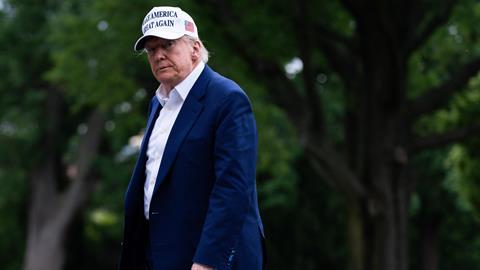An executive order handed down against a law firm by the Trump administration has been comprehensively defeated in court after a judge found it violated the constitution. Describing the action as a ‘blunderbuss’ of an order, District Judge John D Bates said the attempt to restrict Jenner & Block violated the first amendment, protecting free speech.
The ruling deals a blow to President Trump’s campaign of using executive orders against firms that have employed political opponents or represented causes with which he disagrees. While some firms have chosen to negotiate and offer to work pro bono on government projects Jenner & Block was one of those that took legal action to challenge the order. The president had accused the 900-strong firm of pursuing ‘obvious partisan representations to achieve political ends,’ including pro bono representation of immigration clients and advocacy groups involved in gender-based litigation.
Read more
In a ruling handed down in Washington DC on Friday, Bates concluded that a permanent injunction was necessary to overturn this order. He said it was ‘uniquely harmful’ for its focus on pro bono work and sullied the tradition that lawyers pursue ideals higher than profit. ‘It casts a chill over the whole of the legal profession, leaving lawyers around the country weighing the necessity of vigorous representation against the peril of crossing the federal government,’ said the judge.
Bates said the order forced Jenner & Block to make a choice: either change its speech or suffer a serious injury to its livelihood. The Trump administration had threatened 40% of the firm’s income which came from government contractors or affiliates.
The order was an ‘unconstitutional act of retaliation’ and the government had failed to offer any reason why Jenner & Block had been targeted other for its speech. Very little evidence had been presented to show that the firm’s diversity policies were discriminatory and the materials presented suggested its approach was the same as the majority of companies in the US private sector.
‘Going after law firms in this way is doubly violative of the constitution,’ summarised the judge. ‘Most obviously, retaliating against firms for the views embodied in their legal work—and thereby seeking to muzzle them going forward—violates the first amendment’s central command.'
‘More subtle but perhaps more pernicious is the message the order sends to the lawyers whose unalloyed advocacy protects against governmental viewpoint. becoming government-imposed orthodoxy. This order, like the others, seeks to chill legal representation the administration doesn’t like, thereby insulating the executive branch from the judicial check fundamental to the separation of powers.’
In a statement following the ruling, Jenner & Block said: 'We are pleased with the court’s decision to decisively strike down an unconstitutional attack on our clients’ right to have zealous, independent counsel and our firm’s right to represent our clients fully and without compromise. This is the second ruling striking down these executive orders, which—as the court found—threaten “not only the first amendment but also the right to counsel’s promise of a conflict-free attorney” devoted solely to the interests of his client'.
'Our decision to fight the executive order in court is rooted in Jenner & Block’s history and values: we fiercely advocate for our clients under all circumstances. This ruling demonstrates the importance of lawyers standing firm on behalf of clients and for the law.'
This article is now closed for comment.
































22 Readers' comments